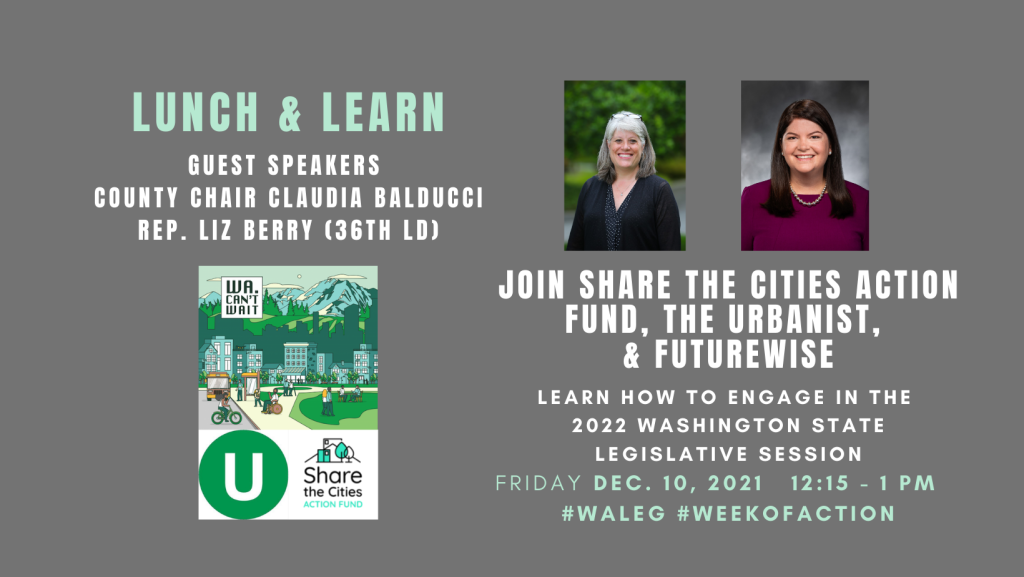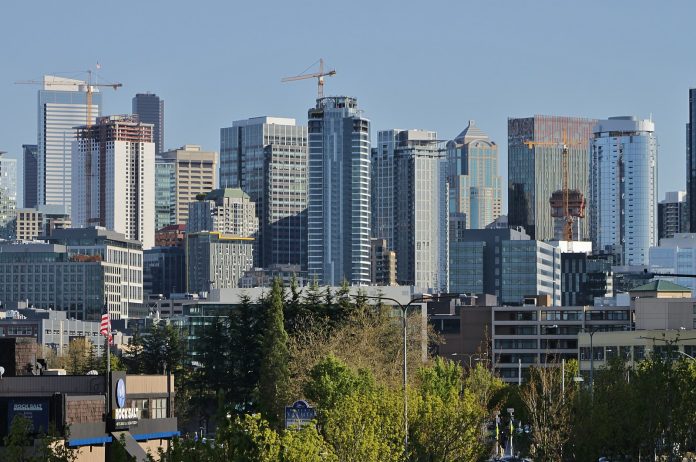Washington State 2022 Legislative Session Lunch & Learn, Friday, December 10th, 12:15-1pm. Join online here.
From the housing affordability crisis, to the need to reduce carbon emissions, to the steady creep of suburban sprawl, Washington State faces big challenges related to land-use and planning. That means during the upcoming (short) legislative session, lawmakers will have a lot on their plates. Want to learn more about how you can help ensure that the most consequential legislation tackling these critical issues succeeds in the legislature this year? Then participate in a Lunch & Learn session tomorrow, hosted by Futurewise, Share the Cities Action Fund, and, of course, The Urbanist. Guest speakers State Representative Liz Berry (Democrat – 36th Legislative District) and Claudia Balducci (King County Council Chair – 6th District) will share insights into inspirational laws proposed for 2022 — and the best ways to engage effectively with your legislators to get them across the finish line.

This year, Futurewise has created a Washington Can’t Wait advocacy platform centered on reforming the state’s Growth Management Act (GMA) so that it better succeeds in furthering housing equity, , promoting environmental justice, and combating the climate crisis. The organization has identified three bills of interest to push for during the coming session.
House Bill 1220: Housing Equity and Affordability
HB1220funding_onepager by Natalie Bicknell on Scribd
Futurewise has called HB 1220 a “game changer” for its potential to further housing affordability and equity in Washington State. If implemented, HB 1220 will require cities and counties engage in planning for housing affordable to people at all income levels, redress impacts from historic racist housing policies, like redlining, and identify communities at high risk of displacement and implement anti-displacement polices, programs, and regulations.
The legislation would also require that all cities and counties planning under the GMA adequately plan for and allow homeless shelters in a majority of their jurisdiction. This would make it much more difficult for cities like Bellevue, which has historically stymied creation of homeless shelters within its boundaries, from using zoning to prevent shelters from being built. King County Chair Balducci, who fought to have a permanent homeless shelter built in the Eastgate neighborhood of Bellevue during her time as mayor, will certainly have a lot of say about this bill and its potential impacts.
State Bill 5042: Environmental Protection
SB5042_onepager by Natalie Bicknell on Scribd
SB 5042 would finally close the GMA’s ‘illegal growth loophole’ to protect farmland, forests, and critical habitats from unnecessary sprawl. To draw attention to the illegal growth loophole, Futurwise published a three part series with The Urbanist earlier this fall. Articles included:
- Goodbye Farmland, Hello McMansions: How a major loophole in the GMA has allowed unnecessary sprawl and non-compliant development to gobble up our rural lands for decades.
- How the GMA’s Illegal Growth Loophole Works in Practice: A closer look at the damaging impacts that the illegal growth loophole in the GMA has had in communities across the state.
- What It Will Take to Close the Illegal Growth Loophole in 2022: An overview of legislation that Futurewise has been working on and advocating for over a decade (SB 5042!), which offers a simple solution to the illegal growth loophole. In layman’s terms, the bill would ensure that controversial land use changes by counties don’t go into effect until after a ruling by the Growth Management Hearings Board.
House Bill 1099: Climate Change
HB1220funding_onepager by Natalie Bicknell on Scribd
HB 1099 adds a climate change goal and element to the GMA. If passed the legislation would include a definition of environmental justice in the GMA and stipulate that land-use planning should further environmental justice and not worsen health disparities. It would also require the largest and fastest growing cities counties to select from a list of actions developed by the Department of Commerce to reduce greenhouse gas emissions and reduce vehicle miles traveled. Finally, all cities and counties planning under the GMA would need to create plans to address the impact of climate hazards.
Feeling inspired?
In addition to attending tomorrow’s event, you can also consult the handy Washington Can’t Wait Advocacy Guide, which provides additional details about the proposed bills, an individual advocacy toolkit, and a partner organization advocacy toolkit. Let’s make 2022 a legislative year to remember!
Natalie Bicknell Argerious (she/her) is a reporter and podcast host at The Urbanist. She previously served as managing editor. A passionate urban explorer since childhood, she loves learning how to make cities more inclusive, vibrant, and environmentally resilient. You can often find her wandering around Seattle's Central District and Capitol Hill with her dogs and cat. Email her at natalie [at] theurbanist [dot] org.



